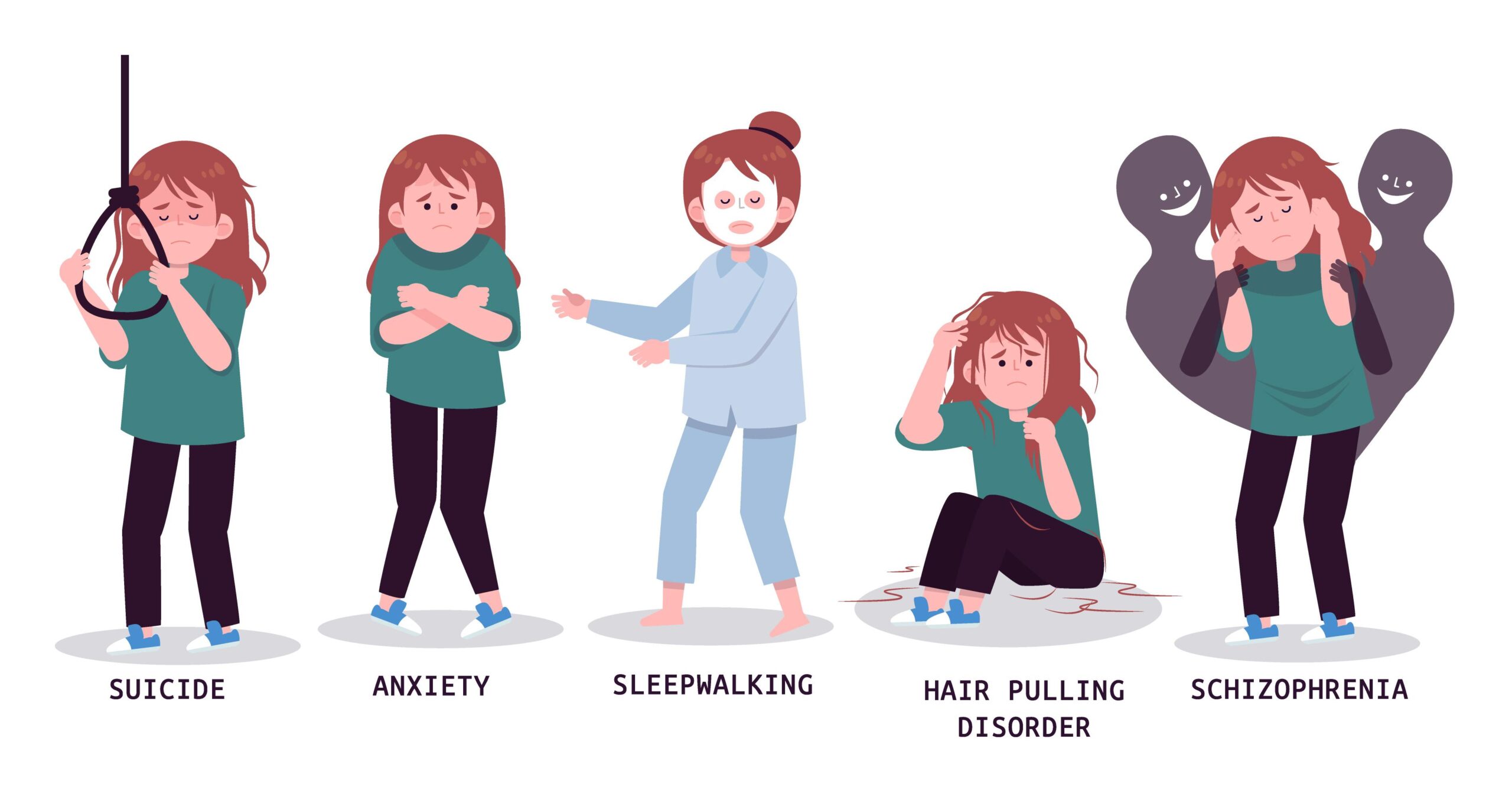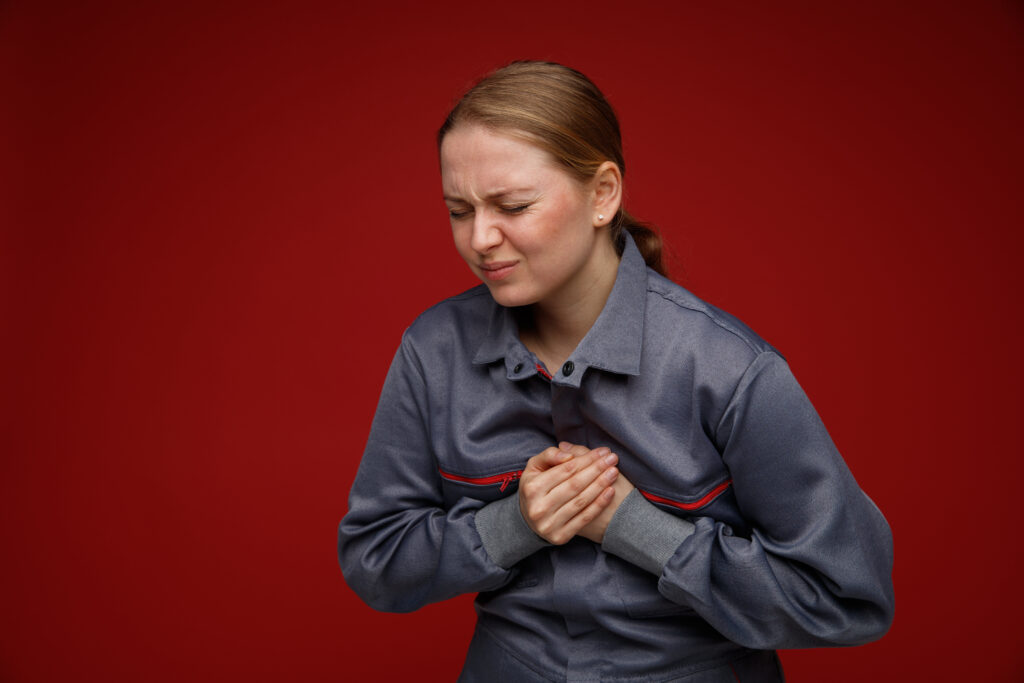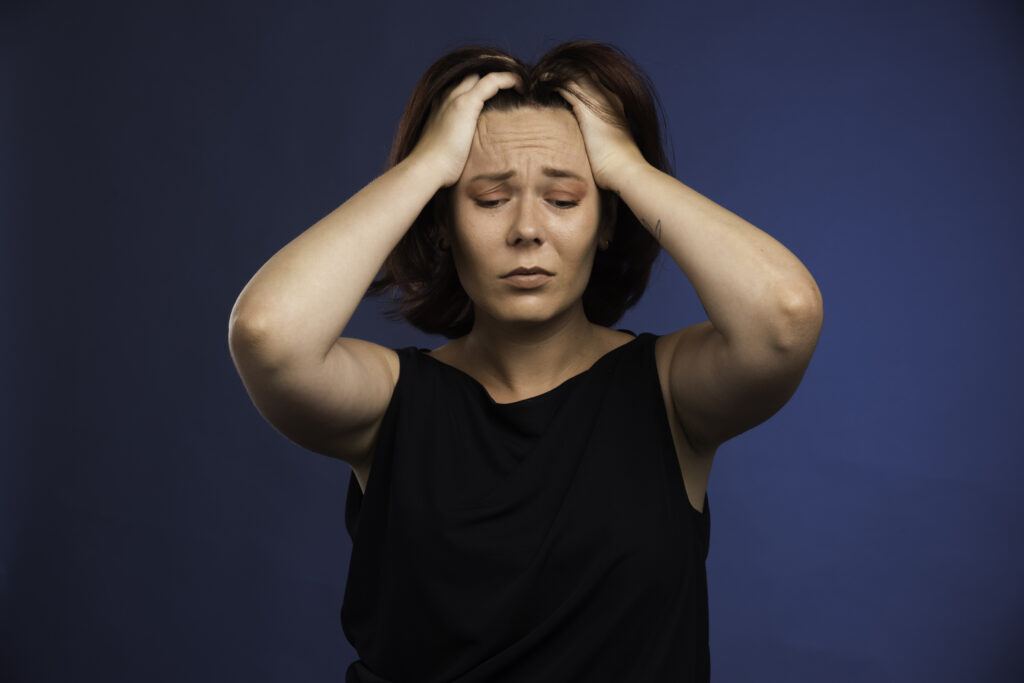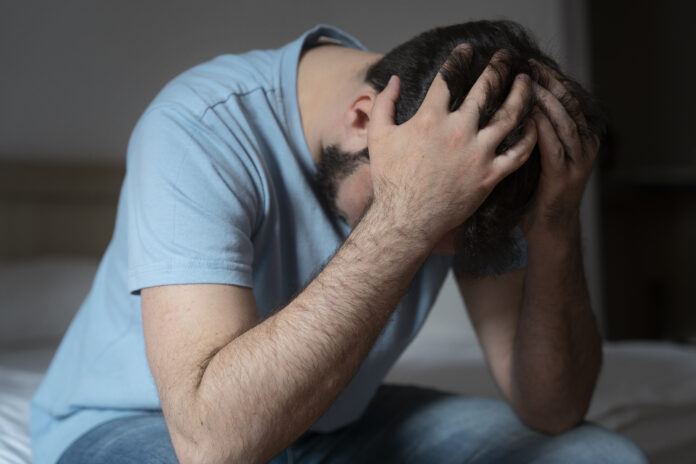Anxiety is the end of your carefree and happy life. Most people experience an anxiety phase in life from time to time but in chronic form it will ruin your mental and physical health. It influences your digestive system, appetite, sleep, thinking ability, peace of mind, heart rate and the blood flow in vessels. In short, it harms you in every aspect of life and the risk factor increases with increase in stress. It will not be wrong to say that the stressed mind is the birthplace of anxiety.
No doubt most of us are familiar with the hazardous effects of anxiety on mental health but, you are surely ignorant to the terrible side effects of it on body or physical health. In this article, we are going to brief you about deadly physical side effects of anxiety on your mind and bodily health.Here we are explaining the symptoms of stress and also suggesting some effective remedies for treatment. So, stay with us.
Physical Symptoms of Anxiety
If you are living a stressful life you are more likely to be affected by anxiety. How will you acknowledge that you have anxiety syndrome? There are many psychological and physical symptoms which alarm the dreadful phase of anxiety. If you find any one, be alert and take steps to avoid it.
 Increased Heart Rate and Palpitations: Your (ANS) Autonomic nervous system shows response when you feel anxiety and it will surprise you that anxiety is the response of stress. Thus stress, anxiety and activity of your autonomic nervous system are interlinked. You gotta fight or flight mode when you are in stress. In this condition, (ANS) increases your heart beat rate to fulfill the demand of oxygen to lessen the chest tightness. This increased heart rate causes heart Palpitations, which are actually the uncontrolled, rapid, arrhythmic heart beats. Although this is a short term condition and considered harmless but if experienced frequently, may cause heart failure or myocardial infarction.
Increased Heart Rate and Palpitations: Your (ANS) Autonomic nervous system shows response when you feel anxiety and it will surprise you that anxiety is the response of stress. Thus stress, anxiety and activity of your autonomic nervous system are interlinked. You gotta fight or flight mode when you are in stress. In this condition, (ANS) increases your heart beat rate to fulfill the demand of oxygen to lessen the chest tightness. This increased heart rate causes heart Palpitations, which are actually the uncontrolled, rapid, arrhythmic heart beats. Although this is a short term condition and considered harmless but if experienced frequently, may cause heart failure or myocardial infarction.
Muscle Tension and Pain: Stress causes stiffness in your muscles and hardens them. This is called muscle tension. If you experience a long term anxiety phase your muscles remain hard for a longer duration and you will suffer from severe muscle pain. It also influences your sitting or standing postures. This may lead to backbone pain and muscular cramps.
Digestive Issues: Nausea and Irritable Bowel Syndrome (IBS): It is the response to pain in the colon of some chemicals produced due to anxiety and stress. When you pass through a stress condition your gut, stomach and colon get upset. Colon feels spasm and these spasms ultimately cause stomach acidity and cramps.This will drag you towards IBS syndrome and the bowel movements may be irritable. As a result you feel nausea and indigestion of food.
Changes in Appetite and Weight: Anxiety disturbs your appetite.When you are in stress you go through a revved-up physical state, in which you lose your appetite sensation for a short period of time. Actually your kidney in stress condition stimulates the adrenal glands to secrete more adrenaline. Thus your body goes into fight or flight mode and doesn’t feel appetite.
Impact on the Respiratory System
Anxiety has direct effects on mental health but mental health influences your physical health.Thus anxiety also has bad impacts on your body. Stress causes anxiety and it changes your heart rate, thus influencing your breathing rate. Your respiratory system may be damaged by stress. Shortness of breath, Hyperventilation, shallow breathing or chest tightness are the major symptoms that anxiety is damaging your respiratory system.

Shortness of Breath and Hyperventilation: You feel helpless when you would not be able to control a situation and want to escape from that one or in case of nervousness you find your heartbeat uncontrolled or increased. This may cause a congested chest and you feel a burden in your chest and breathing becomes difficult. You feel hard to inhale and it seems you have not much air to breath easily. You search for a ventilated place to breathe feasibly. This may make you panic and depressed. Such a condition is known as shortness of breath or hyperventilation.
Shallow Breathing and Chest Tightness: Panic attacks of anxiety are linked with shallow breathing or chest tightness and it causes the narrowing of the respiratory tract and you feel difficulty in breathing, called short breath. Although it’s considered not as harmful as a disorder, with obesity it becomes more dangerous.
Respiratory Disorders Aggravation: A long term depression leads you to an drastic phase. Staying with this anxiety for a continuous duration for a longer period, will take you to the hospital. This lessens your quality of life. Your lungs may be affected and you may suffer from asthma or other respiratory disorders.
Cognitive and Emotional Effects
Working Memory(WM) is your asset to live a successful life. Your working memory is badly affected by continuous anxiety and stress. Ultimately cognitive problems are generated. It is a severe condition of heightened vigilance which causes sensory conflict. Some major problems originated by cognitive issues are discussed below.
Racing Thoughts and Difficulty Concentrating: Due to stress you lose control over your thoughts.You would fail to have pleasant thoughts and have frequent negative thoughts perform a role as a stimulus to distract your attention. You would not be able to concentrate on your actual daily routine tasks. It directly affects your brain and its working. Long run stressed phase causes a great disruption to your thinking ability. Higher levels of anxiety are closely related to lower cognitive performance.

Persistent Worry and Fear: Millions of people have anxiety issues but don’t pay attention. Most of them don’t even know about it. If you remain in a persistent worry or fear condition, this may cause nervous disorders or panic in you. Thus you will lose your control on your thoughts and emotions. The societal stigma makes you unfriendly to your relations. Ultimately you will have an irritating personality, unbearable for others. So, try to vanish fears from your life.
Emotional Symptoms: Irritability and Restlessness: Irritability or restlessness are the results of anxiety. You go through a long phase of disturbed sleep(Insomnia). Negative thoughts surround your mind. Irritations due to lack of sleep makes you dull and fatigued. You lose interest in your duties and feel them a burden.
Sleep Disturbances and Fatigue
Insomnia and Difficulty Falling Asleep: Insomnia, disturbed or difficult sleeping syndrome is a well known symptom of anxiety. Frequent worries generate mental hyper-arousal which is marked by lack of sleep. It provokes a sense of dread in you and you feel fear about bedtime. Thus you lose a peaceful sleep followed by GAD( general anxiety disorder.

Nightmares and Disrupted Sleep Patterns: Stress disturbs your sleep patterns too. You may have nightmares which fill up your mind with negativity about sleep.You want to escape from bed time. It affects your brain performance and pre-sleep rumination causes (REM) rapid eye movement syndrome during sleep. Thus you have fearful disturbed dreaming.
Impact on Overall Energy Levels: People who are prone to anxiety, lose their appropriate sleep and thus have the worst emotional damage. Sleep deprivation is harmful for emotional health. Sleep deprivation also causes breathing lapses during sleep and thus you feel tired even after taking rest. This restlessness lowers your overall energy levels affecting your working memory and working efficiency.
Effects on the Immune System
Your immune system is badly affected by anxiety. This weekends your immunity. In a stressful condition, your body needs white blood cells to overcome the uncertain situation. But cortisol’s lag production inhibits white cells production. Ultimately, your immune system is defeated and you may suffer from various diseases.
Increased Susceptibility to Illness: People with anxiety are more likely to get ill. A hormone cortisol suppresses the immunity and the body fails to defend against attacking pathogens thus increasing the chances of getting ill. Generally people adopt the habits of smoking, drinking or eating to overcome their stress, these bad adaptations are an open invitation for diseases. Slower Recovery from Infections: Anxiety affects your innate immune system. Innate immune system defends your body against bacteria or viruses but anxiety hormones damage this system and the healing process may be disturbed.
Slower Recovery from Infections: Anxiety affects your innate immune system. Innate immune system defends your body against bacteria or viruses but anxiety hormones damage this system and the healing process may be disturbed.
Chronic Inflammation and Autoimmune Response: Inflammation found in any body parts due to unknown stimulus refers to autoimmune. Recent studies show that these may be due to stress or anxiety responses. Anxiety indulges your body to some mysterious conditions when your body tissues attack on themselves followed by chronic inflammation such as rheumatoid arthritis or any other. This is hazardous to your physical health.
Cardiovascular Consequences
Tachycardia, increased heart rate, is a life threatening disorder. Anxiety disturbs your heart rate, elevates your blood pressure, enhances cardiac arrest risk. This may result in cardiovascular damage or a heart failure.

Elevated Blood Pressure: Stress gives temporary spikes to your blood pressure but chronic anxiety may be the cause of permanent disturbance in baseline blood pressure. Frequent spikes on a daily basis can also cause damage to your blood vessels. Narrowing of vessels obstruct the blood flow. It may harm your cardiovascular health.
Increased Risk of Cardiovascular Diseases: Anxiety and heart diseases have a close link. It is the frequently asked question nowadays about how it is related to cardiovascular diseases. Dr, McCann gives the answer that anxiety is a great obstacle to normal heart functioning and normal blood flow. It stresses the cardiac muscles and damages the flexibility of cardiac vessels. So it is proven that it can cause heart diseases.
Impact on Heart Health: Disproportionate level of anxiety causes inflammation to arteries, disturbs blood pressure and damages normal heart rate. Anxiety increases the number of platelets in blood making it more concentrated resulting in difficult flowing and blood clots. That will harm your blood circulation and may damage your heart.
Hormonal Imbalances
Dysregulation of Stress Hormones (Cortisol): Anxiety creates an imbalance in hormone production and function as well. Levels of various hormones change due to it. Disturbance in production of Cortisol hormone enhances stress level three to five times. Imbalance in Catecholamines hormones affects skeletal muscles, blood flow, glucose level and sodium retention.

Disruption of Reproductive Hormones: Estrogen and progesterone hormones secreted by the ovary are disturbed by anxiety and create sex problems. Lower estrogen levels, damages the ovulation procedure. Thus causing reproductive imbalance.
Impact on Menstrual Cycles: Abnormal production of Gonadotropin hormone disturbs the menstrual cycle in females. Weight gain, hot flashes and mood swings are also caused by disturbance in hormones. Stress causes premenstrual exacerbation in females, dropping levels of sex hormones.
Long-Term Health Consequences
Association with Chronic Conditions: Chronic disease causes persistent anxiety and depression. It damages your health. Treatment of a chronic disease becomes more difficult when a person has anxiety disorder. For example, A heart patient with anxiety, may feel more uncomfortable and may have more panic attacks of chest tightness.
 Contribution to Mental Health Disorders: Anxiety causes many mental disorders such as Alzheimer’s disease, Dementia and substance abuse disorders. Anxiety affects your memory and working ability also decreases while suffering from tensions.
Contribution to Mental Health Disorders: Anxiety causes many mental disorders such as Alzheimer’s disease, Dementia and substance abuse disorders. Anxiety affects your memory and working ability also decreases while suffering from tensions.
Importance of Managing Anxiety for Overall Well-being: How to manage anxiety? This is a very important question for the well being of your life.With the appropriate treatment you may overcome this situation. A wide range of anxiety management techniques such as Mindfulness, Correct breathing, Counseling, Dietary management, Exercise and Medications are applied as remedy.
Conclusion
Anxiety is the state of being emotionally negative. Hopeless future-oriented thoughts snatch the beauty of your life. Perceptions of threat and fear disable you to overcome or control uncertain upcoming situations. All these disabilities make you inappropriate for society. This situation make you feel yourself as useless or inactive for all life dimensions.

Anxiety also damages your physical health by disturbing the functioning of your major body systems like circulatory, respiratory, nervous, digestive and reproductive systems.By adopting good habits of balanced diet, exercise, spending time with friends and family, positive thinking, physical activities may help you to get rid of this terrible disorder.







